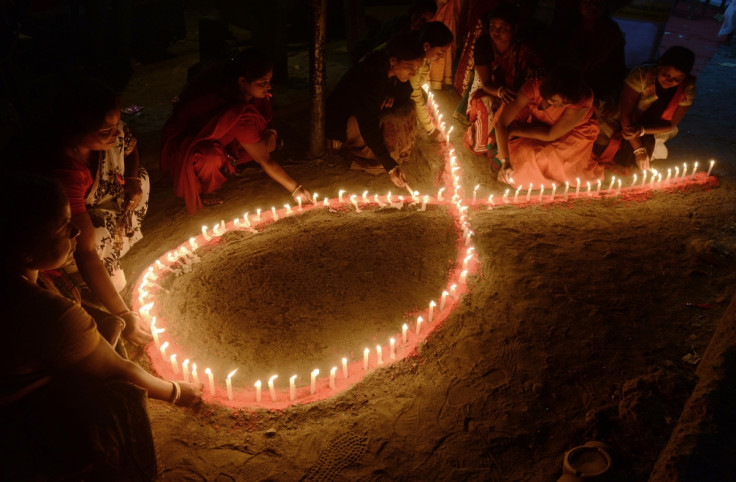World Aids Day 2015: Why eliminating stigma and discrimination is essential to fight HIV

When Matthew* was eight, he and his mother were tied to the bed and the house was set alight. As well as being badly burned, he was mentally scarred and never saw his father again. When he reached age 11, his doctor told him he was HIV positive, having contracted the virus from his mother. Throughout his childhood, he faced neglect and abuse, which turned into prejudice and hatred for his HIV status as he grew older.
Matthew's story is harrowing, but he is far from alone in his experience of HIV-related discrimination. Stigma has shrouded HIV and Aids since the emerging epidemic in the 1980s, when very little was known or understood about the virus and fears spread over its transmission. Today, HIV affects 35m people around the world, yet despite extensive research into the transmission, prevention and treatment of the disease, myths and stereotypes continue to fuel discrimination and prejudice against people with HIV – which has devastating effects on the individuals and the response to the virus itself.
The impact of HIV-related stigma is shattering on an individual. Research by the International Centre for Research on Women found a long list of potential consequences, ranging from loss of income and livelihood through to employment discrimination and feelings of worthlessness. Internalised stigma has an equally damaging effect on the mental wellbeing of people living with HIV, while continuing to build the wall of shame and silence surrounding the virus.
According to the World Health Organisation (WHO), fear of stigma is the main reason why people are reluctant to get tested, disclose their HIV status and take antiretroviral drugs. Another study found that participants who reported high levels of stigma were more than four times likely to report poor access to care – which contributes to the epidemic. Despite the virus only being identified in 1984, more than 35m people have died of HIV or Aids, making it one of the most destructive and deadly pandemics in global history.
Stigma can discourage people from being tested, which can mean more people are diagnosed late. In 2014, Public Health England reported that 40% of people diagnosed with HIV found out late.
The myth linking HIV to "immoral behaviour" often prevents many people from feeling able to be honest to healthcare workers, for fear of judgement over their sexual orientation, gender identity or behaviour, for example, whether someone has injected drugs. Although medical treatment should be confidential, research by the WHO found 34% of respondents in India, Indonesia, the Philippines and Thailand reported breaches of confidentiality by health workers. Both discrimination and distrust of healthcare workers can limit access to life-saving treatment.
Governmental discrimination is an ongoing problem which continues to hinder progress in the fight against HIV. The criminalisation of groups vulnerable to HIV is a global issue, with 60% of countries reporting laws or policies that put barriers in place to HIV prevention and support – such as the banning of harm reduction initiatives in Crimea, Ukraine, after the region was annexed by Russia.
Opioid Replacement Therapy is widely used around the world to wean drug users onto longer-acting opioids such as methadone or buprenorphine, but under Russia's federal law on narcotic and psychotropic substances, the use of both drugs is prohibited. After Russia annexed Crimea in mid-March 2015, in the wake of Ukraine's political upheavals, Russian officials informed 800 methadone recipients that their prescriptions would cease. One methadone user from Sevastopol told the media it was happening at such a pace that there would be a "massacre". According to reports, dozens of people who were being treated with the drug died in the months following the ban.
There are signs of progress in eliminating stigma surrounding HIV and AIDS, but it is essential to increase awareness, raise money and improve education about the virus. Through the UK charity Body & Soul, Matthew has been able to get back onto his feet. He has graduated from university and become a leading voice in his community.
"With Body & Soul's support, my confidence and voice has grown stronger," he says. "I started to represent Body & Soul. I shared my story with different groups and audiences. As I became more engaged with the organisation, I saw it not only as my support system, but as an organisation I could help. I became very involved in their Life in my Shoes campaign and since last September, I've been honoured to serve on their Board of Trustees. You can be liberated from what's controlling you, I'm the proof."
World AIDS Day is on 1 December 2015. Body & Soul is marking the date with Contemporary Africa, a celebration of art and photography from Africa and the Diaspora in collaboration with The Octavia Collective at Ely House in Mayfair. The Exhibition is Open to the Public every day from 29 November to 1 December, from 11am to 5pm.
* Name has been changed to protect identity.
© Copyright IBTimes 2025. All rights reserved.






















